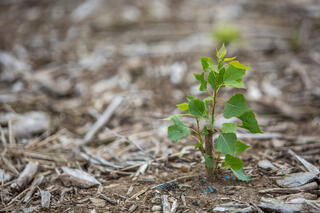Modified poplar lignin eases degradation, production of commodity chemicals

A poplar sapling emerging from the soil at GLBRC’s research plots at the Kellogg Biological Station in Hickory Corners, Michigan.
Objective
To identify poplar enzymes involved in the biosynthesis of monolignol p-hydroxybenzoate groups that can be released with mild alkaline hydrolysis and used as high-value phenolic chemicals.
Approach
Researchers screened 116 BAHD acyltransferase enzymes in vitro and found five capable of producing monolignol-p-hydroxybenzoates. Comparing transcript abundance of those five genes with p-hydroxybenzoate concentrations in naturally occurring unrelated P. trichocarpa genotypes revealed a positive correlation between expression of one gene (pHBMT1) and p-hydroxybenzoate levels. Researchers then overexpressed that gene in hybrid poplar.
Results
Three complementary analytic methods showed an increase in soluble and cell-wall-bound monolignol-p-hydroxybenzoates in the pHBMT1 transgenic poplars. Overexpression did not affect growth patterns or biomass production.
Impact
Based on this discovery, Great Lakes Bioenergy Research Center scientists have patented technology that can be used to make plants with modified lignin amenable to degradation and production of commodity chemicals used in pharmaceutical drugs and cosmetics, potentially enhancing the value to biorefineries.